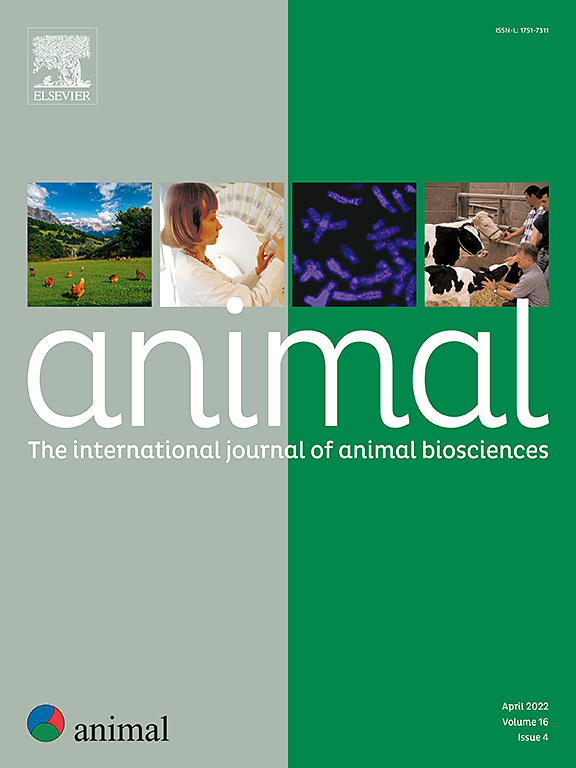在半自由放养的猪中使用鼻夹可以减少生根,而不会破坏附属行为或造成长期压力。
IF 4
2区 农林科学
Q1 AGRICULTURE, DAIRY & ANIMAL SCIENCE
引用次数: 0
摘要
在自然条件下饲养的家猪(Sus scrofa)可以表现出完整的行为技能。然而,生根行为对环境有很大的影响。在促进农场动物福利和环境问题的背景下,本研究调查了鼻夹作为鼻环的一种侵入性较小的替代品,在管理自由放养猪的生根行为方面的潜力。我们收集了两组的行为数据和唾液皮质醇水平:实验组(n = 17)使用鼻夹,对照组(n = 17)不使用鼻夹。在鼻夹术后,我们观察到在第一周内焦虑相关行为和皮质醇水平暂时增加,随后在接下来的几周内恢复到应用前的水平。我们发现,在使用鼻夹后的第一周内,涉及鼻子的亲密互动暂时减少,而没有鼻子接触和攻击水平的亲密互动没有差异。此外,鼻夹有效地减少了破坏性挖掘行为,而不会导致其他探索行为的同时增加。总之,我们的研究结果表明,鼻夹可能是一种解决方案,可以减轻破坏性扎根,同时保护社会互动和动物福利。进一步的研究对于巩固这些发现和评估这种方法的长期影响至关重要。本文章由计算机程序翻译,如有差异,请以英文原文为准。
Nose-clip use in semi-free ranging pigs reduces rooting without disrupting affiliative behaviour or causing prolonged stress
Domestic pigs (Sus scrofa) raised under natural conditions can show their complete behavioural repertoire. However, rooting behaviour can have a great impact on the environment. In the context of the promotion of farm animal welfare and environmental concerns, this study investigated the potential of nose-clips as a less invasive alternative to nose-rings for the management of rooting behaviour of free-ranging pigs. We collected behavioural data and salivary cortisol levels on two groups: an experimental group (n = 17) with nose-clips and a control group (n = 17) without nose-clips. After the nose-clipping, we observed a temporary increase in anxiety-related behaviour and cortisol levels during the 1st week, followed by a return to pre-application levels in the following weeks. We found a temporary decrease in affiliative interactions involving the nose during the 1st week after the application of nose-clips, whereas no differences in affiliative interactions without nose contact and aggression levels were observed. Moreover, nose-clips effectively reduced destructive excavation behaviours, without leading to a simultaneous increase in other exploratory behaviours. In conclusion, our findings show that nose-clips could be a solution that mitigates destructive rooting while preserving social interactions and animal welfare. Further research is essential to consolidate these findings and assess the long-term implications of this approach.
求助全文
通过发布文献求助,成功后即可免费获取论文全文。
去求助
来源期刊

Animal
农林科学-奶制品与动物科学
CiteScore
7.50
自引率
2.80%
发文量
246
审稿时长
3 months
期刊介绍:
Editorial board
animal attracts the best research in animal biology and animal systems from across the spectrum of the agricultural, biomedical, and environmental sciences. It is the central element in an exciting collaboration between the British Society of Animal Science (BSAS), Institut National de la Recherche Agronomique (INRA) and the European Federation of Animal Science (EAAP) and represents a merging of three scientific journals: Animal Science; Animal Research; Reproduction, Nutrition, Development. animal publishes original cutting-edge research, ''hot'' topics and horizon-scanning reviews on animal-related aspects of the life sciences at the molecular, cellular, organ, whole animal and production system levels. The main subject areas include: breeding and genetics; nutrition; physiology and functional biology of systems; behaviour, health and welfare; farming systems, environmental impact and climate change; product quality, human health and well-being. Animal models and papers dealing with the integration of research between these topics and their impact on the environment and people are particularly welcome.
 求助内容:
求助内容: 应助结果提醒方式:
应助结果提醒方式:


